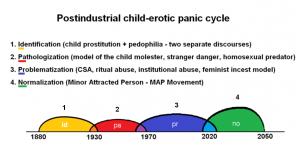Moral panic: Difference between revisions
The Admins (talk | contribs) No edit summary |
The Admins (talk | contribs) No edit summary |
||
| Line 1: | Line 1: | ||
[[File:Cycle.png|thumb|Charting the cycles of panic]] | [[File:Cycle.png|thumb|Charting the cycles of panic]] | ||
'''Moral panic''' refers to a phenomenon in which mainstream society experiences large amounts of fear and uncertainty fuelled by the perception that a particular moral institution (such as [[childhood innocence]]) or group of people (such as [[child]]ren) is under threat. The perceived threat often comes in the form of a socially excluded, alien group of people ([[pedophile]]s or sex offenders) and the ideologies and real life events attributed to them. Necessary to the incitement of moral panic is the | '''Moral panic''' refers to a phenomenon in which mainstream society experiences large amounts of fear and uncertainty fuelled by the perception that a particular moral institution (such as [[childhood innocence]]) or group of people (such as [[child]]ren) is under threat. The perceived threat often comes in the form of a socially excluded, alien group of people ([[pedophile]]s or sex offenders) and the ideologies and real life events attributed to them. Necessary to the incitement of moral panic is the persistant exchange of [[misinformation]], by the media for example. | ||
The concept is often used in the British sociological sense to refer to shorter-term events<ref>[https://en.wikipedia.org/wiki/Moral_panic Wikipedia - Moral Panic]</ref>, such as groups of hooligans or mods supposedly inciting flash panics in society, and the resulting authoritarian crackdowns. This (while it was the original usage, by Stanley Cohen), is a highly questionable phenomenon, since it usually relies on [[moral enterprise]] and media/institutional involvement to manufacture consent. Academics such as [[Bill Thompson]] describe the British theory of Moral Panic as a bourgeoise construct of middle-class sociologists who themselves partake in this manufacturing of consent and benefit from it. | |||
==Quotes on moral panic== | ==Quotes on moral panic== | ||
Revision as of 15:30, 19 November 2021

Moral panic refers to a phenomenon in which mainstream society experiences large amounts of fear and uncertainty fuelled by the perception that a particular moral institution (such as childhood innocence) or group of people (such as children) is under threat. The perceived threat often comes in the form of a socially excluded, alien group of people (pedophiles or sex offenders) and the ideologies and real life events attributed to them. Necessary to the incitement of moral panic is the persistant exchange of misinformation, by the media for example.
The concept is often used in the British sociological sense to refer to shorter-term events[1], such as groups of hooligans or mods supposedly inciting flash panics in society, and the resulting authoritarian crackdowns. This (while it was the original usage, by Stanley Cohen), is a highly questionable phenomenon, since it usually relies on moral enterprise and media/institutional involvement to manufacture consent. Academics such as Bill Thompson describe the British theory of Moral Panic as a bourgeoise construct of middle-class sociologists who themselves partake in this manufacturing of consent and benefit from it.
Quotes on moral panic
Don Pierce, a Sex offender GPS tracking expert on the possibility of surgically implanted GPS for sex offenders:
- "One of the things we want to make sure that we don’t do is something that feels good or looks good or causes the public to relax."[1]